As Anora opens in UK cinemas, we offer a guide to the raw, unflinching cinematic archive of Sean Baker
Between Anora winning the coveted Palme d’Or at Cannes Film Festival, scoring the highest per-screen-average opening of 2024 and topping Oscar predictions lists, few filmmakers are having a better year than Sean Baker. However, this success did not come overnight for the 53-year-old; it follows two decades of scraping by on shoestring budgets and doing the rounds on the indie film circuit. Now, his riotous, high-octane tragicomedy about a Russian-American sex worker who spontaneously marries the son of an oligarch has finally earned Baker his moment in the spotlight.
Such subject matter is no new territory for Baker. From exploring the plight of undocumented migrants in Take Out and Prince of Broadway to foregrounding the precarious realities of sex work in Tangerine and The Florida Project, the New Jersey native has always possessed a knack for capturing life on the fringes of society. Unafraid to probe the limits of our empathy, his films reflect a defiant commitment to grappling with morally complex characters and uncomfortable truths – those we too often avert our gaze from when we happen upon them in our own lives.
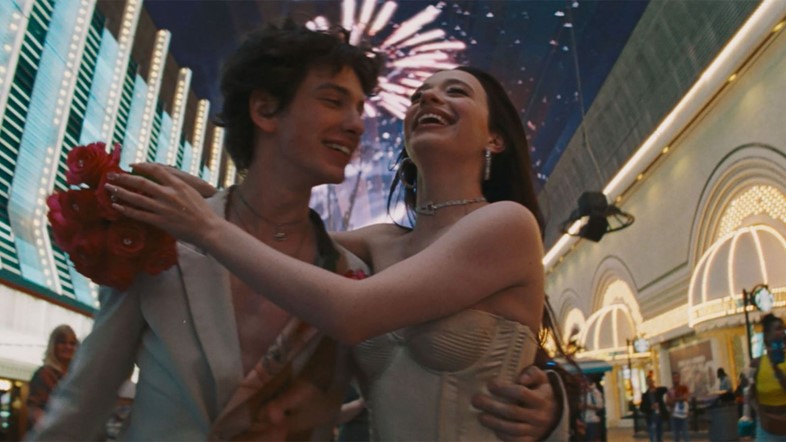
Renowned for street-casting actors in unlikely places (Craigslist, theatre lobbies and local YMCAs, to name a few) and experimenting with improvisational dialogue, each frame embodies a startlingly lived-in quality that allows us to feel less like tourists and more like inhabitants of Baker’s world. It’s precisely this singularity of vision and refusal to sacrifice authenticity at the altar of cinematic convention that situates him as one of the most captivating filmmakers of our time.
Ahead of Anora’s UK release, AnOther recommends six formative works from America’s indie darling.

Take Out (2004)
Although not Baker’s directorial debut, Take Out represents his first formal attempt at the distinctive fly-on-the-wall approach we know him for today. Co-directed with Shih-Ching Tsou (who went on to produce, costume design and act in several of Baker’s subsequent works), the film follows illegal Chinese immigrant Ming Ding who falls behind on payments on his smuggling debt and is given until the end of the day to come up with the money.
Shot for less than $3,000 on a Sony PD150 DV camera, what ensues is an 87-minute, sweat-inducing race against the clock that reveals the tenacity and fragility of the American dream. With rough, handheld tracking shots of Ming weaving his bicycle through traffic, close-ups of cash registers opening and closing and the inclusion of real workers and customers in the background, Take Out asserts itself as one of the most profound on-screen portrayals of New York City.
Nominated for the John Cassavetes Award at the 2008 Film Independent Spirit Awards, the triumph of Baker’s sophomore effort lies in its harrowing revelation that while we often deserve more than we get, the world doesn’t owe us anything.
Read our feature on the film here.
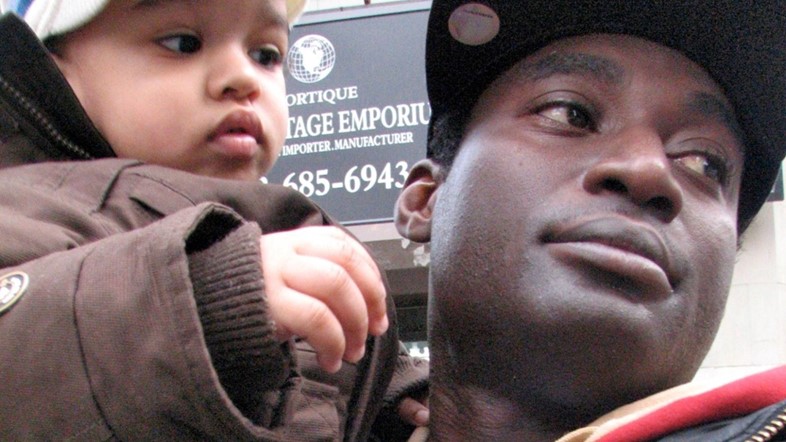
Prince of Broadway (2008)
Prince of Broadway is where Baker hits his stride, seamlessly blending narrative and documentary styles to tell the story of a street hustler burdened with the unexpected responsibility of fatherhood. Partially based on the lead actor Prince Adu’s experiences, the film wastes no time thrusting us into the predicament at hand, as we duck in and out of back rooms filled with counterfeit goods and manoeuvre between brawls and arrests.
At one point, the protagonist staggers through the streets with his son in his arm, crying out, “Why will no one look at me?” – a heartrending embodiment of the filmmaker’s insistence not just on the humanity but also the real hopes and dreams of those so routinely marginalised. In true Baker fashion, Prince of Broadway avoids either sugarcoating or sensationalising its subjects, showing them only as they are and inviting us to challenge our own assumptions about the hidden hardships that underpin the city that never sleeps.
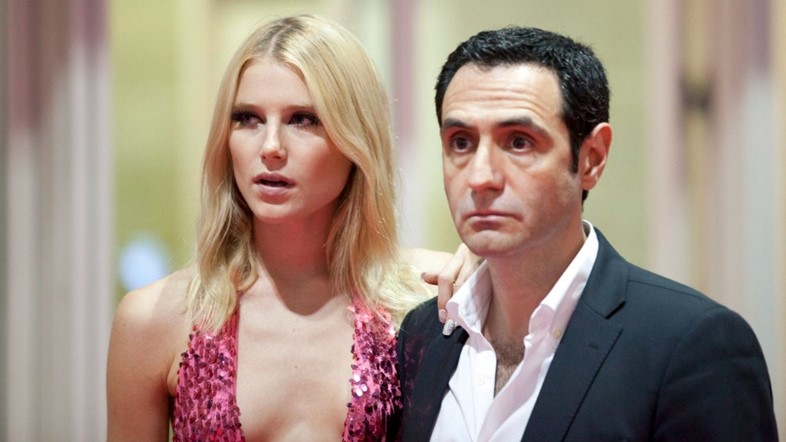
Starlet (2012)
Radiant yet subdued, Starlet charts the unexpected friendship between 21-year-old porn star Jane and 85-year-old Sadie, whose paths cross when the former uncovers a stash of money in a Thermos purchased at the latter’s yard sale. The women find a sense of purpose in each other as they navigate their respective struggles with ageing and loneliness.
Eschewing plot for people, the film relishes in its quiet confidence that we will surrender ourselves to its lackadaisical pace, accompanying the characters through the minutiae of their day-to-day tasks. That the bingo halls, public parks and barely furnished apartments of Californian suburbia feel sentimental by the end of the film is a credit to Baker’s willingness to seek out beauty in the most unassuming of places.
In his words, “I want to feel like I’m living and breathing with the characters and spending time with them.” After all, the titular role belongs to none other than the director’s own bedazzled harness-sporting chihuahua, Boonee.
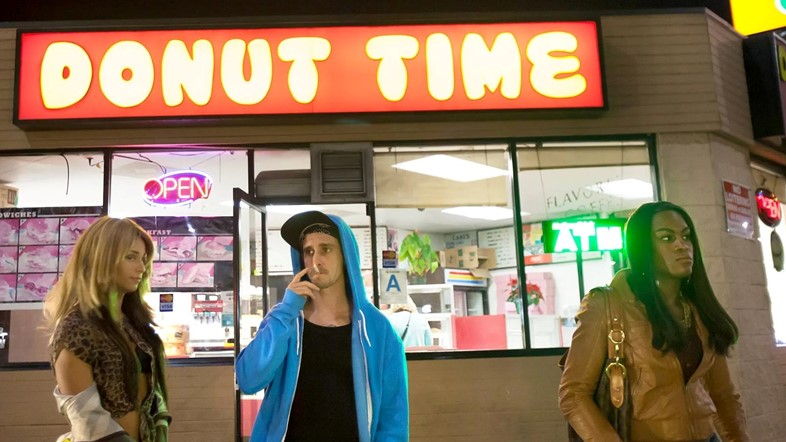
Tangerine (2015)
On Christmas Eve 2013, Baker had an iPhone 5s, Donut Time and a dream. The result? Tangerine – a rip-roaring farce about a transgender sex worker tracking down her cheating pimp through the hyper-saturated streets of Los Angeles. Brought to life by the infectious double act of first-time actors Kitana Kiki Rodriguez and Mya Taylor, the film brims over with both laugh-out-loud comedy (“You didn’t have to Chris Brown the bitch!”) and striking vulnerability (“The world can be a cruel place.”)
Lensed entirely through the Apple device, Baker’s fifth feature rides on a kinetic, guerrilla-style energy that offers a candid glimpse into a community that demands to be seen and heard on its own terms. Culminating in a 20-minute confrontation at a fluorescent-lit doughnut joint that exposes a slew of lies and betrayals, it emphasises the tenderness of friendship amidst what can otherwise be a hard-knock existence. Going on to win the Audience Award at the 2015 Gotham Awards, this is the film that put the Tisch alumnus on the map as a serious voice in independent cinema.
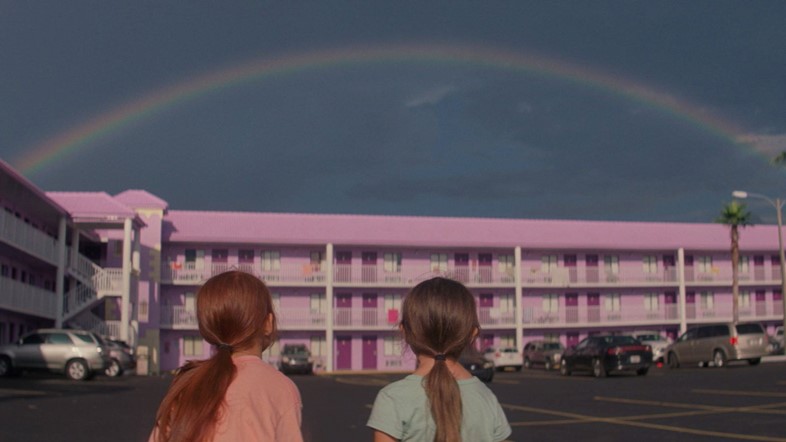
The Florida Project (2017)
The most critically acclaimed of Baker’s catalogue so far, The Florida Project is a bittersweet snapshot of a mother and daughter navigating the looming threat of homelessness. Subverting the name of Walt Disney’s utopian vision, this “Florida project” sheds light on the world of dilapidated motels that serve as makeshift homes for low-income families across America.
Yet, the fantasy remains alive for the rambunctious trio at the core of the film: six-year-old Moonee (played with preternatural sensitivity by Brooklynn Prince), her best friend Scooty and new girl Jancey. Together, they spend their summer break scamming tourists for free ice cream, hurling spit at car windshields and setting abandoned houses on fire. Drenched in hazy 35mm, Baker envelops us in their childlike sense of wonder, as we meander aimlessly from neon buildings to grassy plains to candy-floss sunsets.
Treading the line between joy and despair is no mean feat, but Baker’s deeply humanist gaze steers clear of any condescension that typically befalls films of a similar genre. Ultimately, it is Moonee’s innocent words that linger long after the credits roll: “You know why this is my favourite tree? Because it tipped over, and it’s still growing.”
Read our feature on the film here.
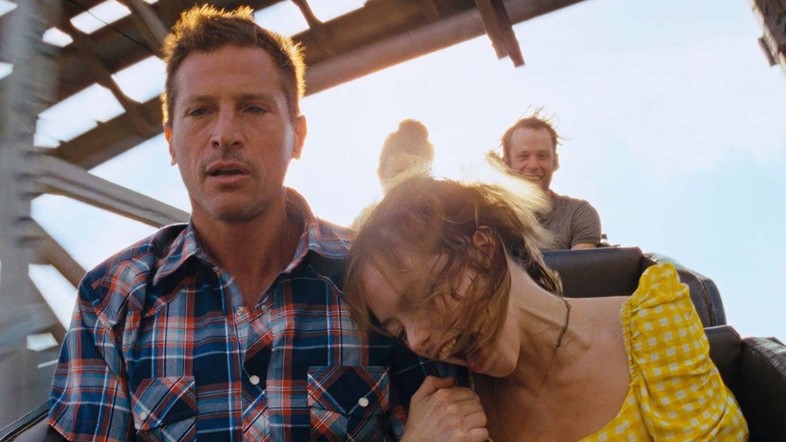
Red Rocket (2021)
Red Rocket has everything going for it – numerous needle drops of NSYNC’s Bye Bye Bye, the most inspired line delivery of “homeless suitcase pimp” committed to screen and well, Simon Rex. Set against the backdrop of small-town Texas, the film acts as a character study of washed-up male porn star Mikey Saber, who sets his beady eyes on a local teenage girl as the protégé that will restore him to fame and glory.
Baker operates at full throttle here, splicing gritty realism and dark humour together to transform a portrait of dysfunction into something oddly moving. Rex (rumoured to have dabbled in porn in the 90s himself) puts in a mesmeric, one-of-a-kind performance as Mikey, shifting imperceptibly from charm to narcissism to bitterness all in one frame.
Lacking any neat resolutions to its intricate themes of male ego, sexual exploitation and self-delusion, Red Rocket encourages us instead to reckon with the inherently human instinct to reinvent and survive – no matter the cost. What we are left with is a film that is as audacious and ambitious as its star, cementing Baker as America’s foremost chronicler of life on the brink.
Anora is out in UK cinemas on 1 November 2024.
